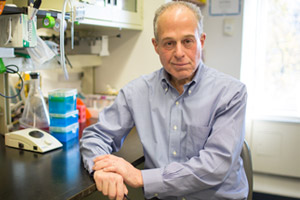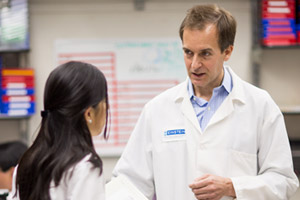
Cardiovascular Research
Einstein Receives Prestigious NIH Cardiovascular Research Training Grant
April 2, 2019—(BRONX, NY)— Cardiovascular research encompasses epigenetics, molecular biology, and systems biology. Scientists studying cardiovascular diseases need a strong foundation in these subjects, as well as physiology and epidemiology, to advance the field and develop novel preventive strategies and treatments.

Richard N. Kitsis, M.D.Albert Einstein College of Medicine, part of Montefiore, will provide advanced interdisciplinary cardiovascular research training for scientists thanks to a new Kirschstein Institutional National Research Service Award (T32). This competitive $1.2 million grant from the National Institutes of Health will support training for two predoctoral and two postdoctoral scholars over the next five years. (The predoctoral slots could be for Ph.D. or M.D./Ph.D. students; the postdoctoral slots could be research or cardiology fellows.)
“Einstein’s program will provide the next generation of investigators with state-of-the art training in cardiovascular research,” said Richard N. Kitsis, M.D., the principal investigator on the grant and professor of medicine and cell biology, director of the Wilf Family Cardiovascular Research Institute, and the Dr. Gerald and Myra Dorros Chair in Cardiovascular Disease at Einstein and a cardiologist at Montefiore. “Our program will include a wide range of scientific disciplines for teaching scientists broad-based technical and conceptual approaches they can apply in their research.”
The program will focus on three areas: how the heart changes with aging and with injury, such as myocardial infarction; formation of the vasculature system and diseases that compromise it; and metabolic conditions, including diabetes, that increase patients’ risk for cardiovascular disease.

Nicholas Sibinga, M.D.We want to give investigators the concepts, experiences, and skills for initiating and sustaining successful, long-term, independent careers dedicated to decreasing the burden of cardiovascular disease in our society,” said Nicholas Sibinga, M.D., co-principal investigator on the grant, professor of medicine and of developmental & molecular biology at Einstein, and a cardiologist at Montefiore.
Einstein was one of the first institutions in the nation to establish a formal molecular cardiovascular biology program in 1987, and it has a long tradition of cardiovascular research training. The Kirschstein-funded program furthers Einstein’s mission to educate and train researchers to accelerate scientific progress and improve human health.
Eighteen faculty members from six departments will take part in the training program. These will include basic scientists, translational scientists, clinical researchers, and epidemiologists. “Another benefit of our cross-disciplinary approach is that Einstein scientists working in fundamental areas of biology, basic cardiovascular scientists, and clinical cardiologists at Montefiore will be working together, which we expect will lead to new, productive collaborations,” Dr. Kitsis said.
The grant is titled “Mechanisms of Cardiovascular Disease” (T32HL144456). Einstein has been home to previous NIH cardiovascular training grants. Except for the past five years, the Einstein program has been funded continuously since 1975.
Other Top Stories
9/11 World Trade Center Exposure Linked to Heart Disease Among NYC Firefighters
On Becoming a Physician: New Einstein Students Receive White Coats and Stethoscopes
Novel Therapy for Acute Migraine Shows Promise in Phase 3 Clinical Trial
First Complete Wiring Diagram of an Animal's Nervous System
Multimillion Dollar NIH Grant to Help Reduce Opioid Use & Get Care to People Who Need It
NIH Grant Funds $23 Million Study of Diseases Affecting People Living with HIV
New TAILORx Data Guides Adjuvant Therapy in Younger Breast Cancer Patients
Einstein Celebrates Its 61st Commencement
Bolstering Biopsies: Testing Patients' Individual Cells to Guide Treatment



